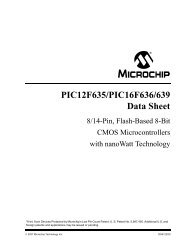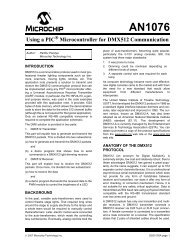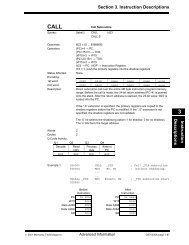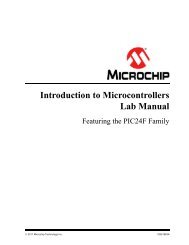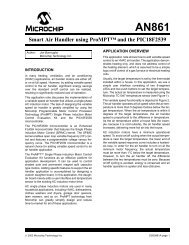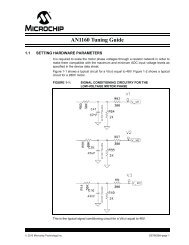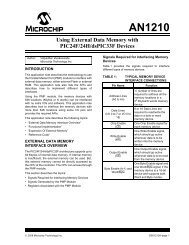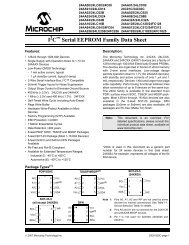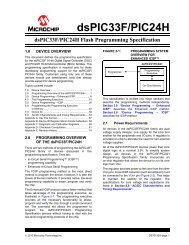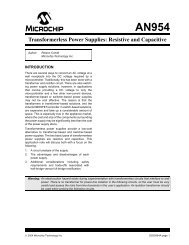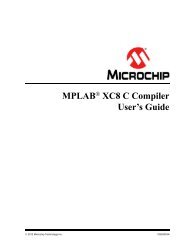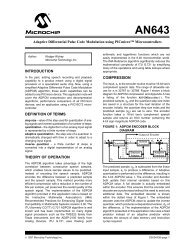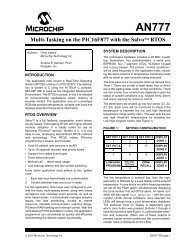MPLAB C Compiler for PIC24 MCUs and dsPIC DSCs ... - Microchip
MPLAB C Compiler for PIC24 MCUs and dsPIC DSCs ... - Microchip
MPLAB C Compiler for PIC24 MCUs and dsPIC DSCs ... - Microchip
Create successful ePaper yourself
Turn your PDF publications into a flip-book with our unique Google optimized e-Paper software.
16-Bit C <strong>Compiler</strong> User’s Guide<br />
psv<br />
Allocate the variable in program space, in a section designated <strong>for</strong> program space<br />
visibility window access. The linker will locate the section so that the entire variable<br />
can be accessed using a single setting of the PSVPAG register. Variables in<br />
PSV space are not managed by the compiler <strong>and</strong> can not be accessed using ordinary<br />
C statements. They must be explicitly accessed by the programmer, usually<br />
using table-access inline assembly instructions, or using the program space<br />
visibility window.<br />
eedata - <strong>dsPIC</strong>30F <strong>DSCs</strong> only<br />
Allocate the variable in EEData space. Variables in EEData space can not be<br />
accessed using ordinary C statements. They must be explicitly accessed by the<br />
programmer, usually using table-access inline assembly instructions, or using<br />
the program space visibility window.<br />
pmp<br />
Allocate the variable in off chip memory associated with the PMP peripheral. For<br />
complete details please see Section 6.3 “PMP Pointers”.<br />
external<br />
Allocate the variable in a user defined memory space. For complete details<br />
please see Section 6.4 “External Pointers”.<br />
transparent_union<br />
This attribute, attached to a function parameter which is a union, means that the<br />
corresponding argument may have the type of any union member, but the argument is<br />
passed as if its type were that of the first union member. The argument is passed to the<br />
function using the calling conventions of the first member of the transparent union, not<br />
the calling conventions of the union itself. All members of the union must have the same<br />
machine representation; this is necessary <strong>for</strong> this argument passing to work properly.<br />
unordered<br />
The unordered attribute indicates that the placement of this variable may move<br />
relative to other variables within the current C source file.<br />
const int __attribute__ ((unordered)) i;<br />
unused<br />
This attribute, attached to a variable, means that the variable is meant to be possibly<br />
unused. The compiler will not produce an unused variable warning <strong>for</strong> this variable.<br />
weak<br />
The weak attribute causes the declaration to be emitted as a weak symbol. A weak<br />
symbol may be superseded by a global definition. When weak is applied to a reference<br />
to an external symbol, the symbol is not required <strong>for</strong> linking. For example:<br />
extern int __attribute__((__weak__)) s;<br />
int foo() {<br />
if (&s) return s;<br />
return 0; /* possibly some other value */<br />
}<br />
In the above program, if s is not defined by some other module, the program will still<br />
link but s will not be given an address. The conditional verifies that s has been defined<br />
(<strong>and</strong> returns its value if it has). Otherwise ‘0’ is returned. There are many uses <strong>for</strong> this<br />
feature, mostly to provide generic code that can link with an optional library.<br />
DS51284H-page 18 © 2008 <strong>Microchip</strong> Technology Inc.





